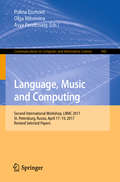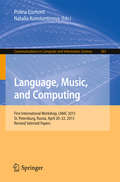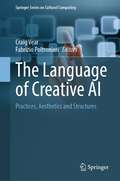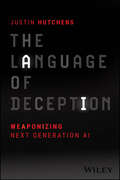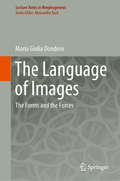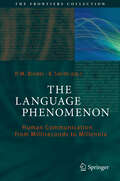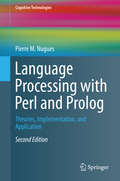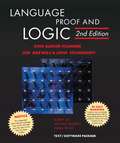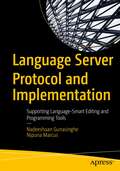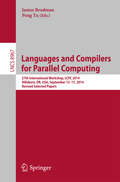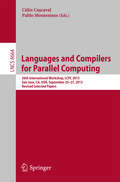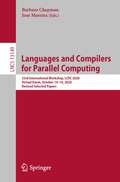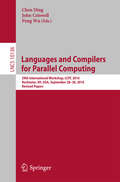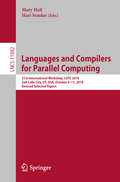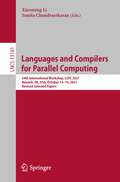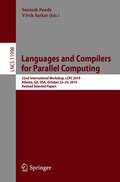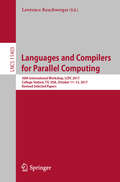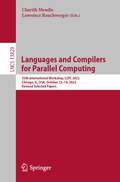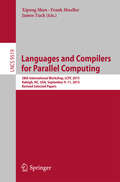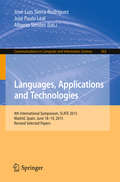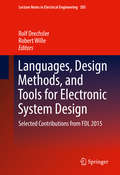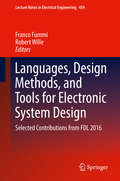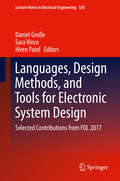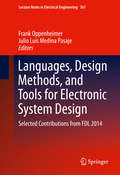- Table View
- List View
Language, Music and Computing: Second International Workshop, Lmac 2017, St. Petersburg, Russia, April 17-19, 2017, Revised Selected Papers (Communications in Computer and Information Science #943)
by Polina Eismont Olga Mitrenina Asya Pereltsvaig<P><P>This book constitutes the proceedings of the First International Workshop on Language, Music and Computing, LMAC 2017, held in St. Petersburg, Russia, in April 2017. <P><P> The 18 papers presented in this volume were carefully reviewed and selected from 52 submissions. They were organized in topical sections on the universal grammar of music, the surface of music and singing, language as music, music computing, formalization of the informality.
Language, Music, and Computing
by Natalia Konstantinova Polina EismontThis bookconstitutes the proceedings of the First International Workshop on Language,Music and Computing, LMAC 2015, held in St. Petersburg, Russia, in April 2015. The 13papers presented in this volume were carefully reviewed and selected from 38 submissions. They were organized in topical sections on music and language in education; corpus studies of language and music; problemsof notation; and linguistic studies of music.
The Language of Creative AI: Practices, Aesthetics and Structures (Springer Series on Cultural Computing)
by Craig Vear Fabrizio PoltronieriCreative AI defines art and media practices that have AI embedded into the process of creation, but also encompass novel AI approaches in the realisation and experience of such work, e.g. robotic art, distributed AI artworks across locations, AI performers, artificial musicians, synthetic images generated by neural networks, AI authors and journalist bots.This book builds on the discourse of AI and creativity and extends the notion of embedded and co-operative creativity with intelligent software. It does so through a human-centred approach in which AI is empowered to make the human experience more creative. It presents ways-of-thinking and doing by the creators themselves so as to add to the ongoing discussion of AI and creativity at a time when the field needs to expand its thinking. This will avoid over-academization of this emerging field, and help counter engrained prejudice and bias. The Language of Creative AI contains technical descriptions, theoretical frameworks, philosophical concepts and practice-based case studies. It is a compendium of thinking around creative AI for technologists, human-computer interaction researchers and artists who are wishing to explore the creative potential of AI.
The Language of Deception: Weaponizing Next Generation AI
by Justin HutchensA penetrating look at the dark side of emerging AI technologies In The Language of Deception: Weaponizing Next Generation AI, artificial intelligence and cybersecurity veteran Justin Hutchens delivers an incisive and penetrating look at how contemporary and future AI can and will be weaponized for malicious and adversarial purposes. In the book, you will explore multiple foundational concepts to include the history of social engineering and social robotics, the psychology of deception, considerations of machine sentience and consciousness, and the history of how technology has been weaponized in the past. From these foundations, the author examines topics related to the emerging risks of advanced AI technologies, to include: The use of Large Language Models (LLMs) for social manipulation, disinformation, psychological operations, deception and fraud The implementation of LLMs to construct fully autonomous social engineering systems for targeted attacks or for mass manipulation at scale The technical use of LLMs and the underlying transformer architecture for use in technical weapons systems to include advanced next-generation malware, physical robotics, and even autonomous munition systems Speculative future risks such as the alignment problem, disembodiment attacks, and flash wars.Perfect for tech enthusiasts, cybersecurity specialists, and AI and machine learning professionals, The Language of Deception is an insightful and timely take on an increasingly essential subject.
The Language of Images: The Forms and the Forces (Lecture Notes in Morphogenesis)
by Maria Giulia DonderoThis book deals with two fundamental issues in the semiotics of the image. The first is the relationship between image and observer: how does one look at an image? To answer this question, this book sets out to transpose the theory of enunciation formulated in linguistics over to the visual field. It also aims to clarify the gains made in contemporary visual semiotics relative to the semiology of Roland Barthes and Emile Benveniste. The second issue addressed is the relation between the forces, forms and materiality of the images. How do different physical mediums (pictorial, photographic and digital) influence visual forms? How does materiality affect the generativity of forms? On the forces within the images, the book addresses the philosophical thought of Gilles Deleuze and René Thom as well as the experiment of Aby Warburg’s Atlas Mnemosyne. The theories discussed in the book are tested on a variety of corpora for analysis, including both paintings and photographs, taken from traditional as well as contemporary sources in a variety of social sectors (arts and sciences). Finally, semiotic methodology is contrasted with the computational analysis of large collections of images (Big Data), such as the “Media Visualization” analyses proposed by Lev Manovich and Cultural Analytics in the field of Computer Science to evaluate the impact of automatic analysis of visual forms on Digital Art History and more generally on the image sciences.
The Language Phenomenon
by K. Smith P. M. BinderThis volume contains a contemporary, integrated description of the processes of language. These range from fast scales (fractions of a second) to slow ones (over a million years). The contributors, all experts in their fields, address language in the brain, production of sentences and dialogues, language learning, transmission and evolutionary processes that happen over centuries or millenia, the relation between language and genes, the origins of language, self-organization, and language competition and death. The book as a whole will help to show how processes at different scales affect each other, thus presenting language as a dynamic, complex and profoundly human phenomenon.
Language Processing with Perl and Prolog
by Pierre M. NuguesThe areas of natural language processing and computational linguistics have continued to grow in recent years, driven by the demand to automatically process text and spoken data. With the processing power and techniques now available, research is scaling up from lab prototypes to real-world, proven applications. This book teaches the principles of natural language processing, first covering practical linguistics issues such as encoding and annotation schemes, defining words, tokens and parts of speech and morphology, as well as key concepts in machine learning, such as entropy, regression and classification, which are used throughout the book. It then details the language-processing functions involved, including part-of-speech tagging using rules and stochastic techniques, using Prolog to write phase-structure grammars, syntactic formalisms and parsing techniques, semantics, predicate logic and lexical semantics and analysis of discourse and applications in dialogue systems. A key feature of the book is the author's hands-on approach throughout, with sample code in Prolog and Perl, extensive exercises, and a detailed introduction to Prolog. The reader is supported with a companion website that contains teaching slides, programs and additional material. The second edition is a complete revision of the techniques exposed in the book to reflect advances in the field the author redesigned or updated all the chapters, added two new ones and considerably expanded the sections on machine-learning techniques.
Language, Proof and Logic 2nd Edition
by David Barker-Plummer Jon Barwise John EtchemendyThis book covers first-order language in a method appropriate for first and second courses in logic. It is designed to be used by undergraduates in philosophy, computer science, mathematics, and linguistics. Introductory material is presented in a systematic and accessible fashion. Advanced chapters include proofs of soundness and completeness for propositional and predicate logic, as well as an accessible sketch of Godel's first incompleteness theorem. The book is appropriate for a wide range of courses, from first logic courses for undergraduates (philosophy, mathematics, and computer science) to a first graduate logic course.
Language Server Protocol and Implementation: Supporting Language-Smart Editing and Programming Tools
by Nadeeshaan Gunasinghe Nipuna MarcusUnderstand the important aspects of implementing a production-grade language server in support of language-smart tools such as code editors and other programming utilities. This book shows you how to create a single implementation of a language server that can be used by multiple tools, enabling you to do the job once in a way that can be shared and reused. This book covers the language server protocol used for communication between programming tools and your language server. The book also provides an in-depth understanding of the design, implementation, and user experience aspects which should be considered when implementing a language server. The book walks you through an example language server implementation to illustrate the basic concepts, then goes on to cover advanced aspects of language server use such as progress reporting, launchers, and extension points. User experience is an important aspect of language server implementation and different tooling vendors strive to provide their own unique user experiences. This book explains how the protocol features can be leveraged to address the unique developer experience provided by different tooling vendors. The book also shows how to enhance the smoothness of the editing experience by orchestrating multiple features together.What You Will LearnImplement a language server from scratchUnderstand language server protocol and its data modelsLeverage the protocol while preserving the unique user experience of different editorsExtend the protocol to support more than its standard capabilitiesRun a language server on top of launchers such as standard I/O and TCP socketSeamlessly incorporate language semantics into your protocol featuresWho This Book Is ForDevelopers focused on and passionate about implementing language development tools such as plug-ins and extensions for interactive development environments (IDEs) or other tools that rely upon parsing of language statements and commands, and developers who need an in-depth understanding of the language server protocol as well as how to use the language server protocol to develop extensible language services
Language, Space and Mind
by Paul ChiltonThe idea that spatial cognition provides the foundation of linguistic meanings, even highly abstract meanings, has been put forward by a number of linguists in recent years. This book takes this proposal into new dimensions and develops a theoretical framework based on simple geometric principles. All speakers are conceptualisers who have a point of view both in a literal and in an abstract sense, choosing their perspective in space, time and the real world. The book examines the conceptualising properties of verbs, including tense, aspect, modality and transitivity, as well as the conceptual workings of grammatical constructions associated with counterfactuality, other minds and the expression of moral force. It makes links to the cognitive sciences throughout and concludes with a discussion of the relationship between language, brain and mind.
Languages and Compilers for Parallel Computing
by James Brodman Peng TuThis book constitutes the thoroughly refereed post-conference proceedings of the 27th International Workshop on Languages and Compilers for Parallel Computing, LCPC 2014, held in Hillsboro, OR, USA, in September 2014. The 25 revised full papers were carefully reviewed and selected from 39 submissions. The papers are organized in topical sections on accelerator programming; algorithms for parallelism; compilers; debugging; vectorization.
Languages and Compilers for Parallel Computing
by Călin Caşcaval Pablo MontesinosThis book constitutes the thoroughly refereed post-conference proceedings of the 26th International Workshop on Languages and Compilers for Parallel Computing, LCPC 2013, held in Tokyo, Japan, in September 2012. The 20 revised full papers and two keynote papers presented were carefully reviewed and selected from 44 submissions. The focus of the papers is on following topics: parallel programming models, compiler analysis techniques, parallel data structures and parallel execution models, to GPGPU and other heterogeneous execution models, code generation for power efficiency on mobile platforms, and debugging and fault tolerance for parallel systems.
Languages and Compilers for Parallel Computing: 33rd International Workshop, LCPC 2020, Virtual Event, October 14-16, 2020, Revised Selected Papers (Lecture Notes in Computer Science #13149)
by Barbara Chapman José MoreiraThis book constitutes the thoroughly refereed post-conference proceedings of the 33rd International Workshop on Languages and Compilers for Parallel Computing, LCPC 2020, held in Stony Brook, NY, USA, in October 2020. Due to COVID-19 pandemic the conference was held virtually. The 15 revised full papers were carefully reviewed and selected from 19 submissions. The contributions were organized in topical sections named as follows: Code and Data Transformations; OpenMP and Fortran; Domain Specific Compilation; Machine Language and Quantum Computing; Performance Analysis; Code Generation.
Languages and Compilers for Parallel Computing
by Chen Ding John Criswell Peng WuThe 19th Workshop on Languages and Compilers for Parallel Computing was heldinNovember2006inNewOrleans, LouisianaUSA. Morethan40researchers from around the world gathered together to present their latest results and to exchange ideas on topics ranging from parallel programming models, code generation, compilationtechniques, paralleldatastructureandparallelexecution models, toregisterallocationandmemorymanagementinparallelenvironments. Out of the 49 paper submissions, the Program Committee, with the help of external reviewers, selected 24 papers for presentation at the workshop. Each paper had at least three reviews and was extensively discussed in the comm- tee meeting. The papers were presented in 30-minute sessions at the workshop. One of the selected papers, while still included in the proceedings, was not p- sented because of an unfortunate visa problem that prevented the authors from attending the workshop. We werefortunateto havetwooutstanding keynoteaddressesatLCPC2006, both from UC Berkeley. Kathy Yelick presented Compilation Techniques for Partitioned Global Address Space Languages. In this keynote she discussed the issues in developing programming models for large-scale parallel machines and clusters, and how PGAS languages compare to languages emerging from the DARPA HPCS program. She also presented compiler analysis and optimi- tion techniques developed in the context of UPC and Titanium source-to-source compilers for parallel program and communication optimizations. "
Languages and Compilers for Parallel Computing: 31st International Workshop, LCPC 2018, Salt Lake City, UT, USA, October 9–11, 2018, Revised Selected Papers (Lecture Notes in Computer Science #11882)
by Mary Hall Hari SundarThis book constitutes the thoroughly refereed post-conference proceedings of the 31st International Workshop on Languages and Compilers for Parallel Computing, LCPC 2018, held in Salt Lake City, UT, USA, in October 2018. The 14 revised full papers were carefully reviewed and selected from 26 submissions. Specific topics are compiling for parallelism and parallel compilers, static, dynamic, and adaptive optimization of parallel programs, parallel programming models and languages, formal analysis and verification of parallel programs, parallel runtime systems and libraries, performance analysis and debugging tools for concurrency and parallelism, parallel algorithms and concurrent data structures, parallel applications, synchronization and concurrency control, software engineering for parallel programs, fault tolerance for parallel systems, and parallel programming and compiling for heterogeneous systems.
Languages and Compilers for Parallel Computing: 34th International Workshop, LCPC 2021, Newark, DE, USA, October 13–14, 2021, Revised Selected Papers (Lecture Notes in Computer Science #13181)
by Xiaoming Li Sunita ChandrasekaranThis book constitutes the thoroughly refereed post-conference proceedings of the 34th International Workshop on Languages and Compilers for Parallel Computing, LCPC 2020, held in Delaware, NE, USA, in October 2021.Due to COVID-19 pandemic the conference was held virtually. The 9 revised full papers were carefully reviewed and selected from 11 submissions. The conference covers all aspects of languages, compiler techniques, run-time environments, and compiler-related performance evaluation for parallel and high-performance computing. The scope of the workshop encompasses foundational results, as well as practical experience reports and bold new ideas for future systems.
Languages and Compilers for Parallel Computing: 32nd International Workshop, LCPC 2019, Atlanta, GA, USA, October 22–24, 2019, Revised Selected Papers (Lecture Notes in Computer Science #11998)
by Santosh Pande Vivek SarkarThis book constitutes the thoroughly refereed post-conference proceedings of the 32nd International Workshop on Languages and Compilers for Parallel Computing, LCPC 2019, held in Atlanta, GA, USA, in October 2019.The 8 revised full papers and 3 revised short papers were carefully reviewed and selected from 17 submissions. The scope of the workshop includes advances in programming systems for current domains and platforms, e.g., scientific computing, batch/ streaming/ real-time data analytics, machine learning, cognitive computing, heterogeneous/ reconfigurable computing, mobile computing, cloud computing, IoT, as well as forward-looking computing domains such as analog and quantum computing.
Languages and Compilers for Parallel Computing: 30th International Workshop, LCPC 2017, College Station, TX, USA, October 11–13, 2017, Revised Selected Papers (Lecture Notes in Computer Science #11403)
by Lawrence RauchwergerThis book constitutes the proceedings of the 30th International Workshop on Languages and Compilers for Parallel Computing, LCPC 2017, held in College Station, TX, USA, in October 2017. The 17 full papers presented together with abstracts of 5 keynote talks, 11 invited speakers and 4 poster papers in this volume were carefully reviewed and selected from 26 submissions. LCPC encourages submissions that go outside its original scope of scientific computing to diverse areas that are enable or enhanced by the power of parallel systems such as mobile computing, big data, relevant aspects of machine learning, data centers, cognitive computing, etc. LCPC strongly encourages personal interaction and technical discussions along the initial material.
Languages and Compilers for Parallel Computing: 35th International Workshop, LCPC 2022, Chicago, IL, USA, October 12–14, 2022, Revised Selected Papers (Lecture Notes in Computer Science #13829)
by Lawrence Rauchwerger Charith MendisThis book constitutes the thoroughly refereed post-conference proceedings of the 35th International Workshop on Languages and Compilers for Parallel Computing, LCPC 2022, held in Chicago, IL, USA, in October 2022. The 9 revised full papers were carefully reviewed and selected from 12 submissions. The conference covers all aspects of languages, compiler techniques, run-time environments, and compiler-related performance evaluation for parallel and high-performance computing. The scope of the workshop encompasses foundational results, as well as practical experience reports and bold new ideas for future systems.
Languages and Compilers for Parallel Computing
by Xipeng Shen Frank Mueller James TuckThisbook constitutes the thoroughly refereed post-conference proceedings of the 28thInternational Workshop on Languages and Compilers for Parallel Computing, LCPC2015, held in Raleigh, NC, USA, in September 2015. The19 revised full papers were carefully reviewed and selected from 44 submissions. The papers are organized in topical sections on programming models, optimizingframework, parallelizing compiler, communication and locality, parallelapplications and data structures, and correctness and reliability.
Languages, Applications and Technologies
by Alberto Simões José-Paulo Leal José-Luis Sierra-RodríguezThis bookconstitutes the refereed proceedings of the 4th International Symposium onLanguages, Applications and Technologies, SLATE 2015, held in Madrid, Spain, inJune 2015. The 17 revised full papers presented werecarefully reviewed and selected from 57 submissions. The papers are organizedin topical sections on human-human languages; human-computer languages; computer-computer languages.
Languages, Design Methods, and Tools for Electronic System Design
by Rolf Drechsler Robert WilleThisbook brings together a selection of the best papers from the eighteenth editionof the Forum on specification and Design Languages Conference (FDL), which tookplace on September 14-16, 2015, in Barcelona, Spain. FDL is a well-established international forumdevoted to dissemination of research results, practical experiences and newideas in the application of specification, design and verification languages tothe design, modeling and verification of integrated circuits, complexhardware/software embedded systems, and mixed-technology systems.
Languages, Design Methods, and Tools for Electronic System Design
by Franco Fummi Robert WilleThis book brings together a selection of the best papers from the nineteenth edition of the Forum on specification and Design Languages Conference (FDL), which took place on September 14-16, 2016, in Bremen, Germany. FDL is a well-established international forum devoted to dissemination of research results, practical experiences and new ideas in the application of specification, design and verification languages to the design, modeling and verification of integrated circuits, complex hardware/software embedded systems, and mixed-technology systems.
Languages, Design Methods, and Tools for Electronic System Design: Selected Contributions from FDL 2017 (Lecture Notes in Electrical Engineering #530)
by Daniel Große Sara Vinco Hiren PatelThis book brings together a selection of the best papers from the twentiethedition of the Forum on specification and Design Languages Conference (FDL), which took place on September 18-20, 2017, in Verona, Italy. FDL is a well-established international forum devoted to dissemination of research results, practical experiences and new ideas in the application of specification, design and verification languages to the design, modeling and verification of integrated circuits, complex hardware/software embedded systems, and mixed-technology systems.Covers modeling and verification methodologies targeting digital and analog systems;Addresses firmware development and validation;Targets both functional and non-functional properties;Includes descriptions of methods for reliable system design.
Languages, Design Methods, and Tools for Electronic System Design
by Julio Luis Medina Pasaje Frank OppenheimerThis book brings together a selection of the best papers from the seventeenth edition of the Forum on specification and Design Languages Conference (FDL), which took place on October 14-16, 2014, in Munich, Germany. FDL is a well-established international forum devoted to dissemination of research results, practical experiences and new ideas in the application of specification, design and verification languages to the design, modeling and verification of integrated circuits, complex hardware/software embedded systems, and mixed-technology systems.
